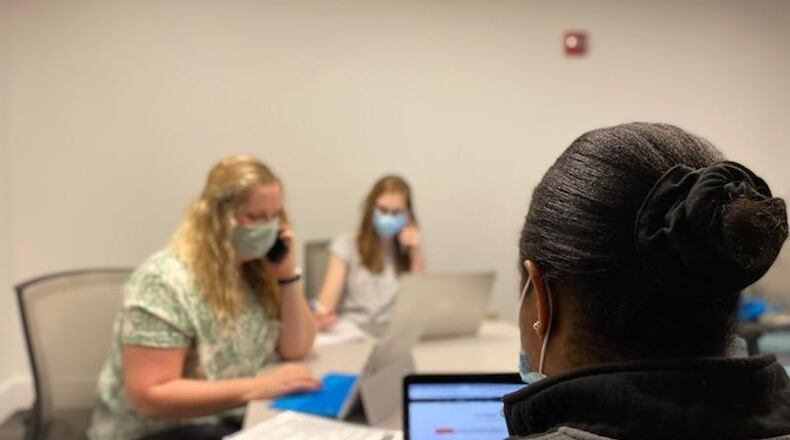Chris Maggard, director of nursing at Preble County Health, said having Wright State students work as contact tracers has been a “tremendous help.”
“Being a small health department, we didn’t have the staff to maintain the need,” Maggard said. “They’re really helping us keep up with the number of calls we need to make.”
Maggard said need for contact tracers is great right now. Health department staff are working long hours seven days a week to make these phone calls.
“We were more than willing to jump in,” said Thad Franz, a professor of pharmacy at Cedarville and the director of the Cedar Care Pharmacy.
Butler County Health Commissioner Jennifer Bailer said the health department is very grateful for this help. Cedarville students are contact tracing for Butler County. Wright State students are helping both Preble and Butler counties.
“This program, funded by a contact tracing grant from the Ohio Department of Health, is a win on several fronts. Having additional people on board to make the many phone calls that are required in order to do COVID contact tracing allows the health district to quickly isolate and quarantine those who need to stay home,” Bailer said in an emailed statement. “Speed is the key to containing the spread of this disease.”
Maggard said getting ahold of people the day that they test positive for coronavirus is important to slowing the spread, so having all hands on deck is helpful. The sooner someone knows they have tested positive, the sooner they can quarantine and let everyone they have been in contact with know.
“Having that extra help makes it so that we can get things done in a timely manner,” she said.
Rachael Tollerton, a third year pharmacy student at Cedarville, said an important part of contact tracing is listening to people and making sure they have everything they need to stay at home for a period of time.
“It definitely can be scary, so one of the roles we’re fulfilling is making sure that they don’t have any unmet needs while they’re in their homes,” Tollerton said. “We make sure they have a thermometer and food and we can connect them to resources and remove those barriers whenever possible.”
Students from both Greene County universities are working remotely. Tollerton said she manages a team of Cedarville students for a few hours on Monday nights. Working and managing a team remotely has been a challenge, she said. Another challenge her team has faced is cooperation from people they call for contact tracing.
“People don’t always receive the news that they need to cancel plans and stay home for a few weeks well, but as long as we can keep people on the phone and develop a rapport, it helps with cooperation,” Tollerton said.
Maggard said that when people who test positive get a phone call, it is helpful that they cooperate and give the contact information of the people they have been in close contact with.
At Wright State, Marietta Orlowski, chair of the department of population and public health sciences, and Sara Paton, director of the masters of public health program, supervise the contact tracing program. Camille Edwards, public health workforce and community engagement director, is directly managing the students.
About 15 students work a day, Edwards said. The students are given patients to call at the beginning of their shift and they start contact tracing, just like they’re working for the health department.
“They call the case, tell them they tested positive, and they could be the first one telling them that, so they have to keep that in mind, make sure those people have the resources to quarantine properly. Then they get a list of their close contacts and call them,” Edwards said.
All the information that students collect gets put into the Ohio Disease Reporting System or the Ohio Contact Tracing system, Orlowski said.
“It’s a win-win,” Orlowski said. “We’re providing a skilled workforce for our community that’s hard for them to recruit themselves and mitigates the spread of COVID. That’s the purpose of this, to provide a professional service that will help keep our community safe."
Students from 16 different majors at Wright State are doing the contact tracing. About 12 Cedarville pharmacy students are doing the work, Franz said.
“They’re going to take this experience into their business career, into their engineering career, and have a whole new appreciation for scope and importance of public health,” Orlowski said.
Cedarville students have been doing this work for about two weeks. Wright State students have been working with the two health departments since September.
“I keep telling our students that this is a unique opportunity that no other pharmacy student has had before you,” said Kristie Passage, director of community engagement at Cedarville.
Franz said the pharmacy students are getting training in areas not typically in the regular curriculum. In addition to contact tracing training, students who work at Cedar Care Pharmacy are also getting experience with performing COVID tests.
“This is providing new opportunities for our profession,” Franz said.
Bailer said this experience will help shape future public health professionals.
“Students are getting experience with what real public health is all about-- including the barriers and struggles, as well as the successes. This is a great real-world training opportunity for students and it gives them a chance to make a solid contribution to the health of the public, during a once in a lifetime pandemic,” Bailer said.
About the Author

